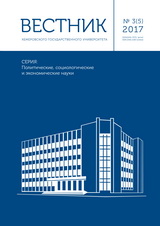Kemerovo, Russian Federation
Interethnic interaction, which is traditionally important in science, politics, and everyday life, largely depends on one’s ethnic identity: the degree of identification with a particular national group, its foundations, culture, and mentality. The information about the manifestations of ethnic identity can timely identify emerging national and international problems in society and find the ways to resolve them. The purpose of this article is to analyze the individual characteristics of the ethnic identity of the population of the Kemerovo Region, obtained by a regional sociological survey conducted by a street express interview in October 2017 among the adult population of the region with a representative sample. The obtained sociological facts demonstrate a relatively low level of cognitive and, especially, behavioral identity of Kuzbass residents, the vast majority belonging to the Russian population. A little more than a third of the respondents admitted a sufficiently high level of awareness of their national culture peculiarities. Most of the national customs and traditions are observed by less than 30 % of the region inhabitants. Two-thirds of Kuzbass residents have never protected the interests of their nationality in any disputes or conflicts. The integral indicator of the level of ethnic identity was just over 3 points on a five-point scale. A low degree of ethnicity speaks of the need to adjust national policies at the regional and municipal levels.
national identity, ethnic identity, interethnic interaction, national culture, sociological research





















